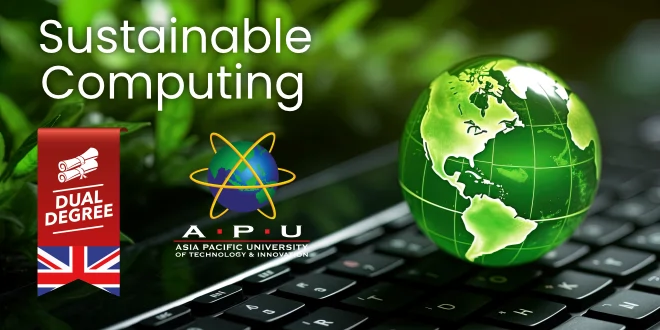Sustainable Computing in IT refers to practices and strategies designed to minimize the environmental impact of computing technology.
This includes various aspects such as energy efficiency, waste reduction, and the use of environmentally friendly materials.
Graduates of APU BSc of IT in Sustainable Computing can pursue careers as sustainability consultants, green IT managers, renewable energy analysts, and environmental data analysts.
They are helping organizations adopt practices which are friendly for ecosystem, reduce carbon footprints, and contribute to a sustainable future.
This specialization is particularly relevant in modern world, where environmental concerns are paramount, making it a promising field with meaningful career prospects.
Program Outline
APU BSc IT in Sustainable Computing aims to teach students:
- Developing an awareness of how technology affects the environment and adopt practices which are friendly for ecosystem.
- Achieving the skills to design software and hardware that conserve energy, incorporate renewable resources, and responsibly handle data.
- Placing a strong emphasis on ethical considerations, increasing collaboration across various fields, and supporting for environmentally conscious technology.
- Engaging in practical projects and real world applications that helps students to apply sustainable computing techniques and measure their positive environmental impact.
Degree Level 1
In year 1, students will obtain essential skills needed for IT professionals. They will gain a basic understanding of computer systems, including computer architecture, operating systems, networks, and databases.
Additionally, there are specialized courses that cover the basics of web design and development. These courses also focus on enhancing personal and organizational skills while increasing creativity and innovation.
Common Courses
- Intercultural Awareness and Cultural Diversity
- Introduction to Networking
- Operating Systems and Computer Architecture
- Programming with Python
- Digital Thinking and Innovation
- Systems Analysis and Design
- Mathematical Concepts for Computing
- Introduction to Databases
- Introduction to C Programming
- Fundamentals of Entrepreneurship
Specialized Courses
- Fundamentals of Web Design & Development
Degree Level 2
In year 2, students will obtain skill set that extends their understanding of sustainable computing principles. This includes a holistic approach, considering the environmental, social, and economic dimensions of computing technology.
APU teaches advanced sustainable computing concepts, addressing areas like green computing, sustainable technology policies, and the application of sustainable practices within enterprise resource planning environments.
Common Courses
- Programming for Data Analysis
- Systems Development Methods
- Object Oriented development with Java
- Innovation Process
- Probability and Statistical Modelling
- Network Security
- Human Computer Interaction
- Web Applications
- Research Methods for Computing and Technology
Specialized Courses
- Green Computing
- Sustainable Technology and Policy
- Integrated Business Processes with SAP ERP Systems
Internship
To bridge the gap between academic and professional worlds, students will experience an Internship or Industrial Training for at least 16 weeks. This ensures they transition smoothly from academic settings to real world job scenarios.
Degree Level 3
In year 3, students build upon their previous studies and work experience to become more familiar with sustainable computing. They also improve their personal and professional skills.
Students dive into current trends in sustainable computing, such as renewable energy, digital strategies, and leadership in promoting business practices which are friendly in ecosystem within organizations.
In their final year, they work on a project that addresses a real world problem, showing their ability to apply technical knowledge, critical thinking, and analytical skills, which they show in a personal achievement portfolio.
Common Courses
- Project Management
- Venture Building
Specialized Courses
- Renewable Energy
- Digital Strategy & Analytics
- Sustainable Leadership
- Cloud Infrastructure and Services
- Computer Systems Management
- Investigations in Sustainable Computing
- Advance Database Systems
- Emergent Technology
- Sustainable Computing Project
MQA Compulsory Subjects
- Appreciation of Ethics and Civilization (Malaysian Students)
- Malay Communication Language (Int’l Students)
- Philosophy and Current Issues
- Workplace Professional Skills
- Integrity and Anti-corruption
- Co-Curriculum
APU-DMU Dual Degree
Students enrolled in the Bachelor’s Degree Program are presented with the opportunity to join the APU-DMU Dual Degree Scheme.
By choosing this pathway, upon graduation, students will be awarded two Degree Certificates and Transcripts: one from Asia Pacific University (APU) in Malaysia and another from De Montfort University (DMU) in the UK.
| Duration | Intakes |
| 3 Years (6 Semesters) |
14 Mar 2024 | 25 Jul 2024 24 Sep 2024 | 21 Nov 2024 |
Admission Requirements
| General Requirements | |
| Direct Entry to Level 1 of Degree | |
| STPM | Applicants must have achieved 2 Passes in STPM, with a Grade C (GP 2.0) or better in any discipline, along with a Mathematics Credit in SPM. |
| A-Level | Applicants need 2 Passes in A-Level, accompanied by a Credit in Mathematics from SPM/O-Level/IGCSE or similar. Note: If a student has passed Mathematics but hasn’t achieved a Credit from SPM/IGCSE or similar, a foundational Mathematics course is mandatory, taken either beforehand or at the study’s onset. |
| UEC | Candidates must have 5 Grade B Passes in UEC, covering Mathematics. Note: If a student passes Mathematics without a Credit from SPM/IGCSE or a comparable certification, an initial Mathematics course is compulsory before or as their studies commence. |
| Foundation/ Matriculation | Successful completion of Matriculation or Foundation studies with a minimum 2.0 CGPA and a Mathematics Credit from SPM/ IGCSE/ O-Level or an equivalent is required. Note: Students with a pass in Mathematics but without the requisite Credit from SPM/IGCSE or its equivalent need to undertake a foundational Mathematics course at the beginning or before starting the main course. |
| Other Diplomas | Those holding a Diploma in Science, Technology, or Business, with at least a 2.50 CGPA and a Credit in Mathematics from SPM/IGCSE or similar, can gain entry following a thorough evaluation by APU. Note: There’s potential for credit transfer into a Bachelor’s Degree based on meeting specific criteria for credit transfer. |
| Direct Entry to Level 2 of Degree | |
| ICT Related Diplomas | A Diploma in IT & Computing fields with a minimum CGPA of 2.50 and the necessary criteria for Credit Transfer awaits the APU Academic Board’s approval. Note: Candidates with a CGPA between 2.0 and 2.5 might be considered upon a detailed assessment by APU, with the final decision resting with the Academic Board. |
English Requirements for International Students
- IELTS : 5.0
- TOEFL iBT : 40
- Pearson (PTE) : 47
- MUET : Band 3.5
Career Options
- Green IT Consultant
- Sustainability Analyst
- Corporate Sustainability Manager
- Data Centre Sustainability Specialist
- IT Sustainability Officer
- ICT Environmental Manager
- Project Manager (Sustainability Project)
- Sustainable ERP Officer
FAQs
1.What makes APU a good choice for studying Sustainable Computing?
- APU is known for its innovative programs, industry connections, and emphasis on practical, real-world skills. Its diverse international student community and state-of-the-art facilities also make it a great choice.
2.What kind of support services are available for international students?
- APU provides various support services including academic advising, counseling, career services, and assistance with visa applications.
Program Fees
APU BSc of IT in Sustainable Computing fees is different for Malaysian and International Students. Following table show the fees for each year and all duration of the program.
| Malaysian Students | International Students |
| Year 1: RM 31,700 | Year 1: RM 32,000 (USD 7,270) |
| Year 2: RM 32,800 | Year 2: RM 33,100 (USD 7,520) |
| Year 3: RM 33,800 | Year 3: RM 34,400 (USD 7,820) |
| Total: RM 98,300 | Total: RM 99,500 (USD 22,610) |
 SharifStudy Best way to Study in Malaysia
SharifStudy Best way to Study in Malaysia




